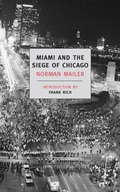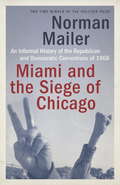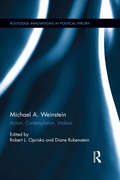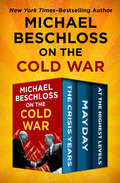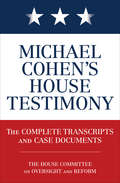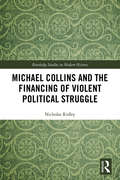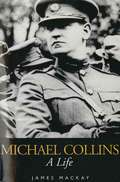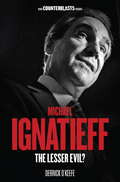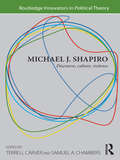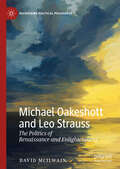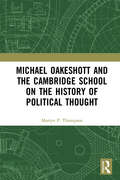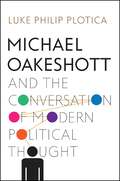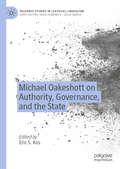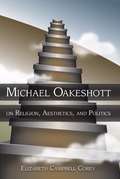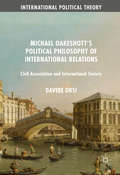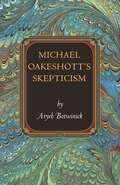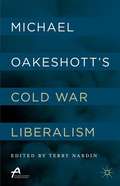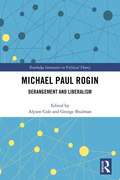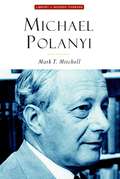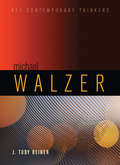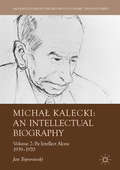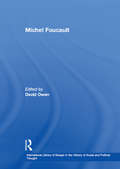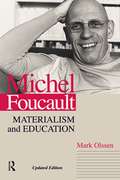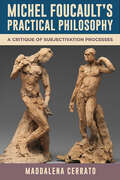- Table View
- List View
Miami and the Siege of Chicago
by Norman Mailer Frank Rich1968. The Vietnam War was raging. President Lyndon Johnson, facing a challenge in his own Democratic Party from the maverick antiwar candidate Eugene McCarthy, announced that he would not seek a second term. In April, Martin Luther King Jr. was assassinated and riots broke out in inner cities throughout America. Bobby Kennedy was killed after winning the California primary in June. In August, Republicans met in Miami, picking the little-loved Richard Nixon as their candidate, while in September, Democrats in Chicago backed the ineffectual vice president, Hubert Humphrey. TVs across the country showed antiwar protesters filling the streets of Chicago and the police running amok, beating and arresting demonstrators and delegates alike. In Miami and the Siege of Chicago, Norman Mailer, America's most protean and provocative writer, brings a novelist's eye to bear on the events of 1968, a decisive year in modern American politics, from which today's bitterly divided country arose.
Miami and the Siege of Chicago
by Norman Mailer<p>In this landmark work of journalism, Norman Mailer reports on the presidential conventions of 1968, the turbulent year from which today’s bitterly divided country arose. <p>The Vietnam War was raging; Martin Luther King, Jr., and Robert F. Kennedy had just been assassinated. In August, the Republican Party met in Miami and picked Richard Nixon as its candidate, to little fanfare. <p>But when the Democrats backed Lyndon Johnson’s ineffectual vice president, Hubert Humphrey, the city of Chicago erupted. Antiwar protesters filled the streets and the police ran amok, beating and arresting demonstrators and delegates alike, all broadcast on live television—and captured in these pages by one of America’s fiercest intellects.
Miami in the Anthropocene: Rising Seas and Urban Resilience
by Stephanie WakefieldReimagining adaptation amidst climate change–driven mutations of urban space and life Between its susceptibility to flooding and an ever-expanding real estate market powered by global surges of people and capital, Miami is an epicenter of the urban Anthropocene and a living laboratory for adaptation to sea level rise. Miami in the Anthropocene explores the social, environmental, and technical transformations involved in climate adaptation infrastructure and imaginaries in a global city seen as climate change ground zero. Using Miami as a compelling microcosm for understanding the complex interplay between urbanization and environmental upheaval in the twenty-first century, Stephanie Wakefield shows how &“aqua-urban futures&” are being imagined for the city, from governmental scenario exercises for severe weather events to proposals to transform the city&’s metropolitan area into an archipelago of islands connected by bridges. She examines the shifts reweaving the fabric of urban life and presents designs that imagine dramatic new ways of living with water. Grounded in the dynamic landscape of Miami but reaching far beyond its shores, Miami in the Anthropocene delves into the broader debates shaping urban thought and practice in the Anthropocene. Focusing on postresilience urban designs, Wakefield illuminates the path toward a future where cities embrace opportunities for evolution rather than merely for survival.
Michael A. Weinstein: Action, Contemplation, Vitalism (Routledge Innovations in Political Theory)
by Diane Rubenstein Robert L. OpriskoThis book is a major reassessment of Michael Weinstein’s political philosophy. It situates his singular contribution, designated as "critical vitalism," in the context of both canonical American and contemporary continental theory. Weinstein is presented as a philosopher of life and as an American Nietzsche. Yet the contributors also persuasively argue for this form of thinking as a prescient prophecy addressing contemporary society’s concern over the management of life as well as the technological changes that both threaten and sustain intimacy. This is the first full scale study of Weinstein’s work which reveals surprising aspects of a philosophic journey that has encompassed most of the major American (pragmatic or vitalist) or Continental (phenomenological or existential) traditions. Weinstein is read as a comparative political theorist, a precursor to post-structuralism, and as a post-colonial border theorist. A different aspect of his oeuvre is highlighted in each of the book’s three sections. The opening essays comprising the "Action" diptych contrasts meditative versus extrapolative approaches; "Contemplation" stages a series of encounters between Weinstein and his philosophic interlocutors; "Vitalism" presents Weinstein as a teacher, media analyst, musician, and performance artist. The book contains an epilogue written by Weinstein in response to the contributors.
Michael Beschloss on the Cold War: The Crisis Years, Mayday, and At the Highest Levels
by Michael Beschloss Strobe TalbottRiveting accounts of the Cold War power struggles from the New York Times–bestselling author and “nation’s leading presidential historian” (Newsweek). The Crisis Years: A national bestseller on the complex relationship between President John F. Kennedy and Soviet Premier Nikita Khrushchev, this “definitive” history covers the tumultuous period from 1960 through 1963 when the Berlin Wall was built, and the Bay of Pigs invasion and the Cuban Missile Crisis brought the United States and Soviet Union to the brink of nuclear war (David Remnick, The New Yorker). “Impressively researched and engrossingly narrated.” —Los Angeles Times Mayday: On May Day 1960, Soviet forces downed a CIA U-2 spy plane flown by Francis Gary Powers, two weeks before a crucial summit. This forced President Dwight Eisenhower to decide whether to admit to Nikita Khrushchev—and the world—that he had secretly ordered the flight. Drawing on previously unavailable CIA documents, diaries, and letters, as well as the recollections of Eisenhower’s aides, Beschloss reveals the full high-stakes drama. “One of the best stories yet written about just how those grand men of diplomacy and intrigue conducted our business.” —Time At the Highest Levels: Cowritten with Strobe Talbott, At the Highest Levels exposes the complex negotiations between President George Bush and Soviet Premier Mikhail Gorbachev. In December 1989, the Berlin Wall had fallen, millions across the Eastern Bloc were enjoying new freedoms, and the USSR was crumbling. But a peaceful end to the Cold War was far from assured, requiring an unlikely partnership, as the leaders of rival superpowers had to look beyond the animosities of the past and embrace an uncertain future. “Intimate and utterly absorbing.” —The New York Times
Michael Cohen's House Testimony: The Complete Transcripts and Case Documents
by Diversion BooksThe full transcript of one of the most shocking testimonies of the Trump Era and in the history of the United States government. &“I am ashamed that I chose to take part in concealing Mr. Trump&’s illicit acts…. I am ashamed because I know what Mr. Trump is. He is a racist. He is a conman. He is a cheat.&” —from Michael Cohen&’s Opening Statement to the House Oversight Committee &“Michael Cohen…was just disbarred by the State Supreme Court for lying & fraud. He did bad things unrelated to Trump. He is lying in order to reduce his prison time.&” —President Donald J. Trump On February 27, 2019, with the world watching, Michael Cohen—former lawyer and fixer for President Donald J. Trump—took the stand in front of the House Oversight Committee and delivered one of the most sensational days of Congressional testimony in history. Not since President Richard Nixon&’s White House counsel John Dean turned on him during the Watergate scandal has a close presidential associate attacked the character of the chief of state and charged him with criminal acts. Here in one volume is living history—the hard-hitting prepared statements, the damning evidence, the salacious charges, the belligerent questioning, and the stunning revelations.
Michael Collins and the Financing of Violent Political Struggle (Routledge Studies in Modern History)
by Nicholas RidleyMichael Collins was a pivotal figure in the Irish struggle for independence and his legacy has resonated ever since. Whilst Collins’ role as a guerrilla leader and intelligence operative is well documented, his actions as the clandestine Irish government Minister of Finance have been less studied. The book analyses how funds were raised and transferred in order that the IRA could initiate and sustain the military struggle, and lay the financial foundations of an Irish state. Nicholas Ridley examines the legacy of these actions by comparing Collins’ modus operandi for raising and transferring clandestine funds to those of more modern groups engaged in political violence, as well as the laying of foundations for Irish financial and fiscal regulation.
Michael Collins: A Life
by Dr James MackayThe most charismatic figure to emerge during the struggles for the independence of Ireland was undoubtedly Michael Collins. This remarkable biography, which draws on much hitherto unpublished material, charts the dramatic rise of the country boy who became head of the Free State and the commander-in-chief of the army.
Michael Ignatieff
by Derrick O'KeefeOne of the most influential intellectuals in the English-speaking world, Michael Ignatieff's story is generally understood to be that of an ambitious, accomplished progressive politician and writer, whose work and thought fit within an enlightened political tradition valuing human rights and diversity. Here, journalist Derrick O'Keefe argues otherwise. In this scrupulous assessment of Ignatieff's life and politics, he reveals that Ignatieff's human rights discourse has served to mask his identification with political and economic elites.Tracing the course of his career over the last thirty years, from his involvement with the battles between Thatcher and the coal miners in the 1980s to the Balkan Wars of the 1990s, Iraq, Afghanistan, and Israel's 2009 invasion of Gaza, O'Keefe proposes that Ignatieff and his political tradition have in fact stood in opposition to the extension of democracy and the pursuit of economic equality. Michael Ignatieff: The Lesser Evil? is a timely assessment of the Ignatieff phenomenon, and of what it tells us about the politics of the English-speaking West today.From the Trade Paperback edition.
Michael J. Shapiro: Discourse, Culture, Violence (Routledge Innovators in Political Theory)
by Terrell Carver Samuel A. ChambersMichael J. Shapiro’s writings have been innovatory with respect to the phenomena he has taken to be political, and the concomitant array of methods that he has brilliantly mastered. This book draws from his vast output of articles, chapters and books to provide a thematic yet integrated account of his boundary-crossing innovations in political theory and masterly contributions to our understanding of methods in the social sciences. The editors have focused on work in three key areas: Discourse Shapiro was one of the first theorists to demonstrate convincingly, and in a manner that has had a long-standing impact on the field, that language is not epiphenomenal to politics. Indeed, he shows that language is constitutive of politics. From his frequently-cited article on metaphor from the early 1980s to recent work on discourse and globalization, Shapiro has shown that politics happens not only with and through the use of language, but within discourse as a material practice. Culture Gabriel Almond and Sidney Verba’s (1963) famous work on ‘The Civic Culture’ established a long-held but ultimately counterproductive relationship between culture and politics, one in which culture is an independent variable that has effects on politics. Samuel Huntington’s (1998) (in)famous polemic, ‘The Clash of Civilizations’, only pushes this relationship to its breaking point. Shapiro’s rich and numerous writings on culture provide a powerful and important antidote to this approach, as Shapiro consistently shows (across wide-ranging contexts) that politics is in culture and culture is in politics, and no politically salient approach to culture can afford to turn either term into a causal variable. Violence While violence is surely not a theme foreign to political studies, no one has done more or better work in contemporary political theory to bring violence into play as a central term of political thought and to expand our understanding of violence. By reconceptualizing and reinterpreting this term, Shapiro’s work has helped us to rethink the very boundaries between political theory and international relations as putatively separate subfields of political science. And it explains why both political theorists interested in International Relations and International Relations scholars concerned with a broader understanding of international politics must both start with Shapiro’s work as required reading.
Michael Oakeshott and Leo Strauss: The Politics of Renaissance and Enlightenment (Recovering Political Philosophy)
by David McIlwainThis book compares the thought of Michael Oakeshott and Leo Strauss, bringing Oakeshott’s desire for a renaissance of poetic individuality into dialogue with Strauss’s recovery of the universality of philosophical enlightenment. Starting from the conventional understanding of these thinkers as important voices of twentieth-century conservatism, McIlwain traces their deeper and more radical commitments to the highpoints of human achievement and their shared concerns with the fate of traditional inheritances in modernity, the role and meaning of history, the intention and meaning of political philosophy, and the problem of politics and religion. The book culminates in an articulation of the positions of Oakeshott and Strauss as part of the quarrel of poetry and philosophy, revealing the ongoing implications of their thinking in terms of the profound spiritual and political questions raised by modern thinkers such as Hobbes, Hegel, Nietzsche and Heidegger and leading back to foundational figures of Western civilization including St. Augustine and Socrates.
Michael Oakeshott and the Cambridge School on the History of Political Thought
by Martyn P. ThompsonThis book is a critique of Cambridge School Historical Contextualism as the currently dominant mode of history of political thought, drawing upon Michael Oakeshott’s analysis of the logic of historical enquiry. While acknowledging that the early Cambridge School work represented a considerable advance towards genuinely historical histories of political thought, this work identifies two major historiographical problems that have become increasingly acute. The first is general: an insufficiently rigorous understanding of the key concept of "pastness" necessarily presupposed in historical enquiry of all kinds. The second is specific to histories of political thought: a failure to do justice to the varieties of past political thinking, especially differences between ideology and philosophy. In addressing these problems, the author offers a comprehensive account of the history of political thought that establishes the parameters not just of histories of ideological thinking but also of the much disputed character of histories of political philosophy. Since rethinking history of political thought in Oakeshottian terms requires resisting current pressures to turn history into the servant of currently felt needs, the book offers a sustained defence of the cultural value of modernist historical enquiry against its opponents. An important work for political theorists, historians of political thought and those researching intellectual history, the philosophy of history and proposed new directions in contemporary historical studies.
Michael Oakeshott and the Conversation of Modern Political Thought
by Luke Philip PloticaOne of the seminal voices of twentieth-century political thought, Michael Oakeshott's work has often fallen prey to the ideological labels applied to it by his interpreters and commentators. In this book, Luke Philip Plotica argues that we stand to learn more by embracing Oakeshott's own understanding of his work as contributions to an ever-evolving conversation of humanity. Building from Oakeshott's concept of conversation as an engagement among a plurality of voices "without symposiarch or arbiter" to dictate its course, Plotica explores several fundamental and recurring themes of Oakeshott's philosophical and political writings: individual agency, tradition, the state, and democracy. When viewed as interventions into an ongoing conversation of modern political thought, Oakeshott's work transcends the limits of familiar ideological labels, and his thought opens into deeper engagement with some of the most significant thinkers of the twentieth century, including Ludwig Wittgenstein, Charles Taylor, Michel Foucault, and Hannah Arendt. Attending to these often unexpected or unrecognized affinities casts fresh light on some of Oakeshott's most familiar ideas and their systematic relations, and facilitates a better understanding of the breadth and depth of his political thought.
Michael Oakeshott on Authority, Governance, and the State (Palgrave Studies in Classical Liberalism)
by Eric S. KosMichael Oakeshott on Authority, Governance, and the State presents contributions on one of the most important British philosophers of the 20th century. These essays address unique and under-analyzed areas in the literature on Oakeshott: authority, governance, and the state. They draw on some of the earliest and least-explored works of Oakeshott, including his lectures at Cambridge and the London School of Economics and difficult-to-access essays and manuscripts. The essays are authored by a diverse set of emerging and established scholars from Europe, North America, and India. This authorial diversity is not only a testimony to the growing international interest in Oakeshott, but also to a plurality of perspectives and important new insights into the thought of Michael Oakeshott.
Michael Oakeshott on Religion, Aesthetics, and Politics
by Elizabeth Campbell Corey<p>Elizabeth Campbell Corey now makes the case that Oakeshott’s moral and political philosophies are more informed by religious and aesthetic considerations than has previously been supposed. Hers is the first book-length study of this premise, arguing that Oakeshott’s views on aesthetics, religion, and morality are intimately linked in a creative moral personality that underlies his political theorizing. <p>Corey focuses on a wealth of early material from Oakeshott’s career that has only recently been published, as well as his acclaimed “Tower of Babel” essays, to show that these works illuminate his thinking in ways that could not have been realized prior to their publication. She places Oakeshott squarely in the Augustinian tradition, citing his 1929 essay “Religion and the World,” and then identifies his departure from it. She explores Oakeshott’s recurring theme of “living one’s life in the present”; examines his explicit discussions of religion, aesthetics, and morality; and then considers his political thought in light of this moral vision. She finally compares his idea of Rationalism to Eric Voegelin’s concept of Gnosticism and considers both thinkers’ treatment of Hobbes to delineate their philosophical differences.</p>
Michael Oakeshott's Political Philosophy of International Relations
by Davide OrsiThis book argues that Michael Oakeshott's political philosophy contributes to current debates in normative international theory and international political theory on the historical, social, and moral dimension of international society. Davide Orsi contends that the theory of civil association may be the ground for an understanding of international society as a rule-based form of moral association constituted by customary international law. The book also considers the role of evolving practices of morality in debates on international justice. Orsi grounds this work on a study of Oakeshott's philosophical arguments and compares the Oakeshottian perspective to recent constructivist literature in International Relations.
Michael Oakeshott's Skepticism (Princeton Monographs in Philosophy #34)
by Aryeh BotwinickThe English philosopher Michael Oakeshott (1901-1990) is known as a conservative who rejected philosophically ambitious rationalism and the grand political ideologies of the twentieth century on the grounds that no human ideas have ultimately reliable foundations. Instead, he embraced tradition and habit as the guides to moral and political life. In this book, Aryeh Botwinick presents an original account of Oakeshott's skepticism about foundations, an account that newly reveals the unity of his thought. Botwinick argues that, despite Oakeshott's pragmatic conservatism, his rejection of all-embracing intellectual projects made him a friend to liberal individualism and an ally of what would become postmodern antifoundationalism. Oakeshott's skepticism even extended paradoxically to skepticism about skepticism itself and is better described as a "generalized agnosticism." Properly conceived and translated, this agnosticism ultimately evolves into mysticism, which becomes a bridge linking philosophy and religion. Botwinick explains and develops this strategy of interpretation and then shows how it illuminates and unifies the diverse strands of Oakeshott's thought in the philosophy of religion, metaphysics, epistemology, political theory, philosophy of personal identity, philosophy of law, and philosophy of history.
Michael Oakeshott’s Cold War Liberalism
by Terry NardinDuring the Cold War, political thinkers in the West debated the balance between the requirements of liberal democracy and national security. This debate resonates in today's East Asia and especially Korea, where an ideological-military standoff between democracy and a totalitarian system persists. The thinkers often identified as 'Cold War liberals'—Isaiah Berlin, Karl Popper, Raymond Aron, Friedrich Hayek, and Michael Oakeshott—are worth revisiting in this context. Of these, Oakeshott is the least-well understood in East Asia and therefore particularly deserving of attention. Especially valuable are his ideas about the limits of rationalism in politics, the irrelevance of conventional views of liberalism and conservatism, and how constitutional democracy should be defined and defended against various forms of anti-liberal politics. In this book, leading Oakeshott scholars from around the world explore these ideas and their implications for East Asia in ten illuminating and readable essays.
Michael Paul Rogin: Derangement and Liberalism (Routledge Innovators in Political Theory)
by Alyson Cole George ShulmanMichael Paul Rogin’s scholarship profoundly altered the scope, content, and disposition of political theory. He reconstituted the field by opening it to an array of texts, performances, and methods previously considered beyond the purview of the discipline. His work addressed the relationship between dimensions of politics typically split apart – institutional power and cultural forms, material interests and symbolic meanings, class projects and identity politics, the public and the private. Rogin’s scholarship enlarges our sense of the borders and genres defining political theory as a field and enriches our capacity to think critically and creatively about the political. The editors have focused on three categories of substantive innovation: Demonology and Countersubversion Rogin used the concepts “countersubversive tradition” and “political demonology” to theorize how constitutive exclusions and charged images of otherness generated imagined national community. He exposed not only the dynamics of suppressing and delegitimizing political opposition, but also how politics itself is devalued and displaced. The Psychic Life of Liberal Society Rogin addressed the essential contradiction in liberalism as both an ideology and a regime – how a polity professing equality, liberty, and pluralist toleration engages in genocide, slavery, and imperial war. Political Mediation: Institutions and Culture Rogin demonstrated how cultural forms – pervasive myths, literary and cinematic works – mediate political life, and how political institutions mediate cultural energies and aspirations.
Michael Polanyi: The Art of Knowing
by Mark T. MitchellThe polymath Michael Polanyi first made his mark as a physical chemist, but his interests gradually shifted to economics, politics, and philosophy, in which field he would ultimately propose a revolutionary theory of knowledge that grew out of his firsthand experience with both the scientific method and political totalitarianism. In this sixth entry in ISI Books&’ Library of Modern Thinkers&’ series, Mark T. Mitchell reveals how Polanyi came to recognize that the roots of the modern political and spiritual crisis lay in an errant conception of knowledge that served to foreclose any possibility of making meaningful statements about truth, goodness, or beauty. Polanyi&’s theory of knowledge as ineluctably personal but also grounded in reality is not merely of historical interest, writes Mitchell, for it proposes an attractive alternative for anyone who would reject both the hubris of modern rationalism and the ultimately nihilistic implications of academic postmodernism.
Michael Walzer (Key Contemporary Thinkers)
by J. Toby ReinerMichael Walzer is one of the world’s most important political thinkers, whose major works, such as Spheres of Justice and Just and Unjust Wars, have transformed many central debates in contemporary political philosophy. In this book, Toby J. Reiner provides the most wide-ranging and up-to-date introduction to his work available. Reiner examines his writings on topics ranging from justice in war, humanitarian intervention and migration ethics to distributive justice, multiculturalism, and the political role of religion. Situating Walzer’s thought in the intellectual environment of post-war American leftist politics, Reiner demonstrates the importance of his attempt to provide a social-democratic alternative to liberalism, Marxism, and post-modernism. He shows that Walzer has developed a novel approach to political theory based on the thesis that human communities construct the values that give meaning to their lives, giving his work a significance that goes well beyond political theory, into political and social science more broadly.Reiner not only gives a crystal clear guide to Walzer’s ideas for students of political philosophy and general readers, but also develops an original and illuminating new interpretation of his thought that no political theorist can afford to miss.
Michał Kalecki: Rendezvous In Cambridge, 1899-1939 (Palgrave Studies In The History Of Economic Thought)
by Jan ToporowskiThis volume of intellectual biography records the work of Michał Kalecki’s maturity: his work on monetary economics and the theory of profits; his work on the problems of socialism and developing countries; and the extension of his theory of capitalism to define his work in relation to Keynes and previous political economic principles. Kalecki had, by 1939, laid out the essential elements of his theory of the business cycle in capitalism. This book begins at Oxford where, at the Institute of Statistics, he worked on the economic planning and financing of World War Two, as well as extending and detailing the particulars of his theory and examining the conditions for full employment in the post-War international monetary and financial system. Kalecki would then work for the United Nations on full employment, inflation, and developing countries. He departed from the United Nations in 1955, and returned to Poland to extend two new directions of his ideas – on the economics of developing countries and his theory of growth in the socialist economy, alongside further work on business cycles.This book is essential reading for all those who want to understand Kalecki’s lasting contribution to economic theory and policy.
Michel Foucault (International Library of Essays in the History of Social and Political Thought)
by David OwenMichel Foucault was one of the twentieth century’s most influential thinkers whose work has unsettled and transformed the field of social philosophy and the social sciences. The essays and articles selected for this volume are written by many of the most important of Foucault’s interpreters and interlocutors and show the range of Foucault’s influence and the debates it has provoked about Foucault’s own approaches and in relation to substantive areas of social philosophy and social science such as power, critique, enlightenment, law, governance, ethics and truthfulness. This volume provides a comprehensive introduction to, and overview of, the development of Foucault’s thought and demonstrates its enduring significance on our understanding of how we have become what we are.
Michel Foucault: Materialism and Education
by Mark Olssen"Olssen ! brings Foucault to life and sheds new light on understanding his work...Educationalists and scholars across the disciplines will welcome this interpretation of Foucault." Michael A. Peters, University of Glasgow "Olssen distills in brilliant and succinct language the core of Foucault's most important insights. This is a book that every student should read in order to understand how to link theory to practice, and educational thought to legacy and work of one of Europe's great thinkers." Henry Giroux, McMaster University Michel Foucault is arguably one of the most important thinkers of the twentieth century, and his works are some of the most difficult to grasp. Mark Olssen offers an accessible overview of Foucault's thought, putting into context the relevance of Foucault's ideas. Olssen adds important new insights to Foucault scholarship by bringing to light the influences of other thinkers such as Marx, Nietzsche, Gramsci, Habermas, and others on Foucault's development as a thinker, and their influence on the deep historical materialist strand that grounds and uniquely characterizes so much of Foucault's thought.
Michel Foucault’s Practical Philosophy: A Critique of Subjectivation Processes (SUNY series in Contemporary French Thought)
by Maddalena CerratoOffers a holistic approach to Michel Foucault's thought, introducing the idea of practical philosophy as an original interpretative framework.Michel Foucault's thought, Maddalena Cerrato writes, may be understood as practical philosophy. In this perspective, political analysis, philosophy of history, epistemology, and ethics appear as necessarily cast together in a philosophical project that aims to rethink freedom and emancipation from domination of all kinds. The idea of practical philosophy accounts for Foucault's specific approach to the object, as well as to the task of philosophy, and it identifies the perspective that led him to consider the question of subjectivity as the guiding thread of his work. Overall, Cerrato shows the deep consistency underlying Foucault's reflection and the substantial coherence of his philosophical itinerary, setting aside all the conventional interpretations that pivot on the idea that his thought underwent a radical "turn" from the political engagement of the question of power toward an ethical retrieval of the question of subjectivity.
